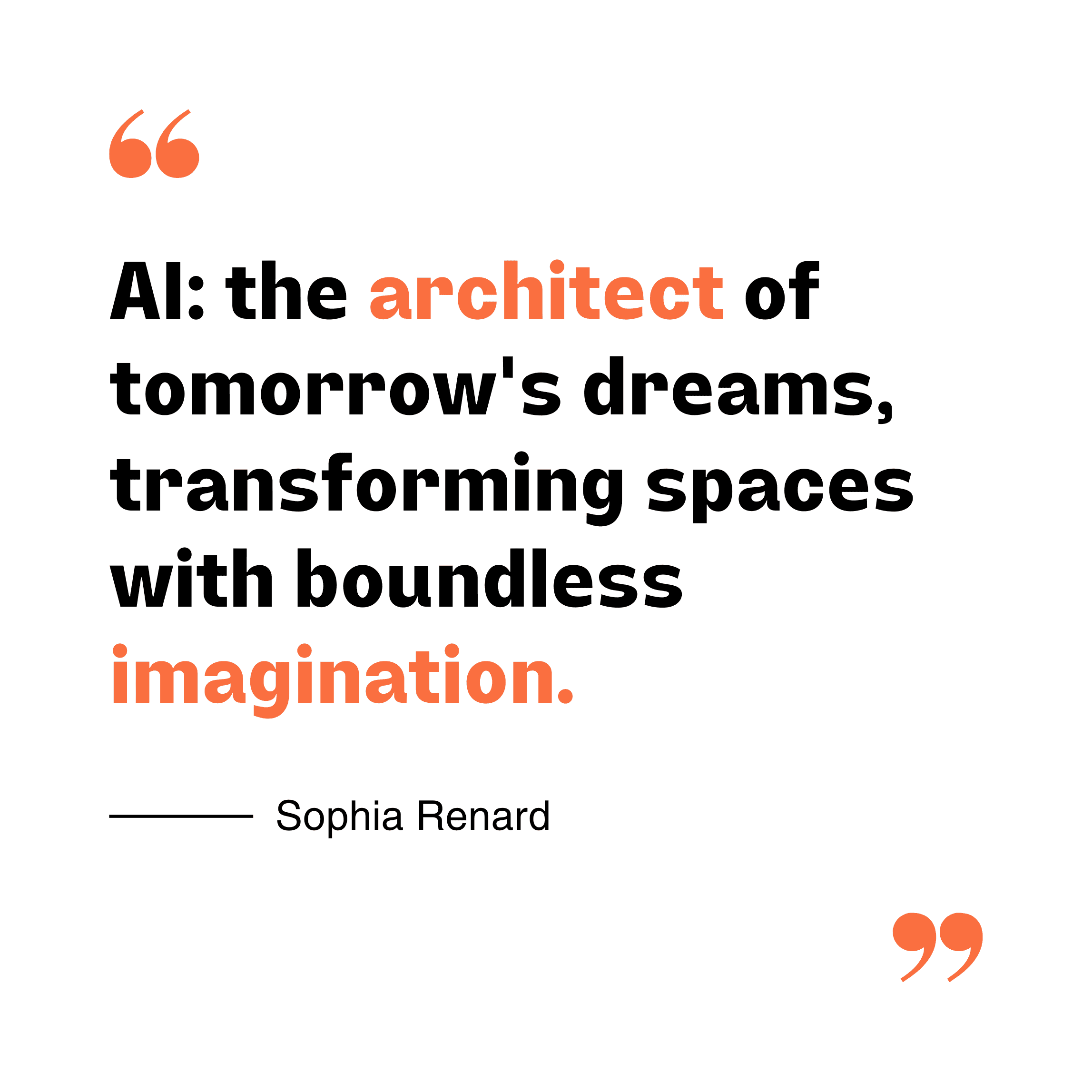Revolutionizing Architecture Engineering and Construction with AI
Revolutionizing Architecture Engineering and Construction with AI
3 octobre 2024
Insights from Denmark's ConTech Lab StudyThe construction industry is on the brink of a major transformation, driven by the rapid advancement and adoption of artificial intelligence (AI) technologies. A recent comprehensive study published by ConTech Lab, a division of Molio in Denmark, provides valuable insights into how AI is reshaping the construction sector and offers guidance on implementing AI solutions effectively.
AI in Construction: Current State and Future Potential
According to the study, AI adoption in the Danish construction industry is growing rapidly, with usage expected to jump from 5% in 2023 to 21% in 2024. This trend is likely to continue, with AI becoming an integral part of construction processes in the near future.The document highlights various applications of AI across different phases of construction projects:
Planning and Design: AI tools can generate and evaluate design proposals, simulate scenarios, and optimize resource allocation.
Project Management: AI-powered platforms can predict risks, analyze schedules, and manage budgets more effectively.
On-site Operations: AI can enhance safety monitoring, quality control, and real-time progress tracking.
Facility Management: AI systems can predict maintenance needs and optimize energy usage in completed buildings.
Insights from Denmark's ConTech Lab StudyThe construction industry is on the brink of a major transformation, driven by the rapid advancement and adoption of artificial intelligence (AI) technologies. A recent comprehensive study published by ConTech Lab, a division of Molio in Denmark, provides valuable insights into how AI is reshaping the construction sector and offers guidance on implementing AI solutions effectively.
AI in Construction: Current State and Future Potential
According to the study, AI adoption in the Danish construction industry is growing rapidly, with usage expected to jump from 5% in 2023 to 21% in 2024. This trend is likely to continue, with AI becoming an integral part of construction processes in the near future.The document highlights various applications of AI across different phases of construction projects:
Planning and Design: AI tools can generate and evaluate design proposals, simulate scenarios, and optimize resource allocation.
Project Management: AI-powered platforms can predict risks, analyze schedules, and manage budgets more effectively.
On-site Operations: AI can enhance safety monitoring, quality control, and real-time progress tracking.
Facility Management: AI systems can predict maintenance needs and optimize energy usage in completed buildings.
Insights from Denmark's ConTech Lab StudyThe construction industry is on the brink of a major transformation, driven by the rapid advancement and adoption of artificial intelligence (AI) technologies. A recent comprehensive study published by ConTech Lab, a division of Molio in Denmark, provides valuable insights into how AI is reshaping the construction sector and offers guidance on implementing AI solutions effectively.
AI in Construction: Current State and Future Potential
According to the study, AI adoption in the Danish construction industry is growing rapidly, with usage expected to jump from 5% in 2023 to 21% in 2024. This trend is likely to continue, with AI becoming an integral part of construction processes in the near future.The document highlights various applications of AI across different phases of construction projects:
Planning and Design: AI tools can generate and evaluate design proposals, simulate scenarios, and optimize resource allocation.
Project Management: AI-powered platforms can predict risks, analyze schedules, and manage budgets more effectively.
On-site Operations: AI can enhance safety monitoring, quality control, and real-time progress tracking.
Facility Management: AI systems can predict maintenance needs and optimize energy usage in completed buildings.
Insights from Denmark's ConTech Lab StudyThe construction industry is on the brink of a major transformation, driven by the rapid advancement and adoption of artificial intelligence (AI) technologies. A recent comprehensive study published by ConTech Lab, a division of Molio in Denmark, provides valuable insights into how AI is reshaping the construction sector and offers guidance on implementing AI solutions effectively.
AI in Construction: Current State and Future Potential
According to the study, AI adoption in the Danish construction industry is growing rapidly, with usage expected to jump from 5% in 2023 to 21% in 2024. This trend is likely to continue, with AI becoming an integral part of construction processes in the near future.The document highlights various applications of AI across different phases of construction projects:
Planning and Design: AI tools can generate and evaluate design proposals, simulate scenarios, and optimize resource allocation.
Project Management: AI-powered platforms can predict risks, analyze schedules, and manage budgets more effectively.
On-site Operations: AI can enhance safety monitoring, quality control, and real-time progress tracking.
Facility Management: AI systems can predict maintenance needs and optimize energy usage in completed buildings.
Challenges and Opportunities
While the potential benefits of AI in construction are significant, the industry faces several challenges in its implementation:
Data Quality and Availability: The construction sector currently utilizes only about 4% of available data. Improving data collection, structuring, and sharing is crucial for effective AI implementation.
Skill Gap: 71% of companies view lack of talent as a major bottleneck, emphasizing the need for strategic competence development.
Ethical and Legal Considerations: The study addresses the importance of developing ethical guidelines and data protection policies for responsible AI use.
Strategies for AI Implementation
The document provides a comprehensive guide for organizations looking to implement AI:
Start Small: Begin with pilot projects to gain experience and understand how AI can be integrated into existing processes.
Develop a Clear Strategy: Set specific goals and KPIs for AI implementation, and create a roadmap for adoption.
Invest in Training: Educate employees and develop necessary AI competencies within the organization.
Foster a Supportive Culture: Create an environment that encourages AI adoption and builds trust in the technology.
Collaborate: Participate in industry-wide initiatives to share data, develop common standards, and pool resources for AI development.
Economic Potential
The study cites reports suggesting that AI technologies could potentially increase productivity in the construction industry by up to 20% and reduce costs by 15-20%.
Early adopters of AI are likely to gain a competitive advantage by delivering projects faster, cheaper, and with higher quality.
Challenges and Opportunities
While the potential benefits of AI in construction are significant, the industry faces several challenges in its implementation:
Data Quality and Availability: The construction sector currently utilizes only about 4% of available data. Improving data collection, structuring, and sharing is crucial for effective AI implementation.
Skill Gap: 71% of companies view lack of talent as a major bottleneck, emphasizing the need for strategic competence development.
Ethical and Legal Considerations: The study addresses the importance of developing ethical guidelines and data protection policies for responsible AI use.
Strategies for AI Implementation
The document provides a comprehensive guide for organizations looking to implement AI:
Start Small: Begin with pilot projects to gain experience and understand how AI can be integrated into existing processes.
Develop a Clear Strategy: Set specific goals and KPIs for AI implementation, and create a roadmap for adoption.
Invest in Training: Educate employees and develop necessary AI competencies within the organization.
Foster a Supportive Culture: Create an environment that encourages AI adoption and builds trust in the technology.
Collaborate: Participate in industry-wide initiatives to share data, develop common standards, and pool resources for AI development.
Economic Potential
The study cites reports suggesting that AI technologies could potentially increase productivity in the construction industry by up to 20% and reduce costs by 15-20%.
Early adopters of AI are likely to gain a competitive advantage by delivering projects faster, cheaper, and with higher quality.
Challenges and Opportunities
While the potential benefits of AI in construction are significant, the industry faces several challenges in its implementation:
Data Quality and Availability: The construction sector currently utilizes only about 4% of available data. Improving data collection, structuring, and sharing is crucial for effective AI implementation.
Skill Gap: 71% of companies view lack of talent as a major bottleneck, emphasizing the need for strategic competence development.
Ethical and Legal Considerations: The study addresses the importance of developing ethical guidelines and data protection policies for responsible AI use.
Strategies for AI Implementation
The document provides a comprehensive guide for organizations looking to implement AI:
Start Small: Begin with pilot projects to gain experience and understand how AI can be integrated into existing processes.
Develop a Clear Strategy: Set specific goals and KPIs for AI implementation, and create a roadmap for adoption.
Invest in Training: Educate employees and develop necessary AI competencies within the organization.
Foster a Supportive Culture: Create an environment that encourages AI adoption and builds trust in the technology.
Collaborate: Participate in industry-wide initiatives to share data, develop common standards, and pool resources for AI development.
Economic Potential
The study cites reports suggesting that AI technologies could potentially increase productivity in the construction industry by up to 20% and reduce costs by 15-20%.
Early adopters of AI are likely to gain a competitive advantage by delivering projects faster, cheaper, and with higher quality.




Conclusion
The ConTech Lab study paints a picture of an industry on the brink of significant change. As AI technologies continue to evolve and mature, they offer the potential to address long-standing challenges in the construction sector, from improving efficiency and safety to enhancing sustainability and quality.For construction companies, the message is clear: embracing AI is no longer optional but a necessity to remain competitive in an increasingly digital world.
By starting small, learning from experiences, and being open to innovation, organizations can harness the power of AI to create substantial value for themselves and the industry as a whole.
As we move forward, collaboration will be key. The study emphasizes the importance of industry-wide initiatives to develop shared data repositories, common standards, and collective AI solutions.
By working together, the construction industry can overcome the challenges of AI adoption and unlock its full potential.The future of construction is intelligent, data-driven, and collaborative. Are you ready to be part of this AI-powered revolution?
Find the latest document here
Instagram: stylyio
Facebook: Styly AI
LinkedIn: Styly AI
By leveraging Styly’s innovative technology and expert resources, you can create a living room that’s not only beautiful but also perfectly tailored to your needs and tastes. Dive into the world of professional interior design and see the difference Styly can make. Start your design adventure today at Styly!
Keywords: AI in construction, ConTech Lab, artificial intelligence, construction industry, project management, facility management, data-driven construction, AI implementation, construction technology, digital transformation in construction
Conclusion
The ConTech Lab study paints a picture of an industry on the brink of significant change. As AI technologies continue to evolve and mature, they offer the potential to address long-standing challenges in the construction sector, from improving efficiency and safety to enhancing sustainability and quality.For construction companies, the message is clear: embracing AI is no longer optional but a necessity to remain competitive in an increasingly digital world.
By starting small, learning from experiences, and being open to innovation, organizations can harness the power of AI to create substantial value for themselves and the industry as a whole.
As we move forward, collaboration will be key. The study emphasizes the importance of industry-wide initiatives to develop shared data repositories, common standards, and collective AI solutions.
By working together, the construction industry can overcome the challenges of AI adoption and unlock its full potential.The future of construction is intelligent, data-driven, and collaborative. Are you ready to be part of this AI-powered revolution?
Find the latest document here
Instagram: stylyio
Facebook: Styly AI
LinkedIn: Styly AI
By leveraging Styly’s innovative technology and expert resources, you can create a living room that’s not only beautiful but also perfectly tailored to your needs and tastes. Dive into the world of professional interior design and see the difference Styly can make. Start your design adventure today at Styly!
Keywords: AI in construction, ConTech Lab, artificial intelligence, construction industry, project management, facility management, data-driven construction, AI implementation, construction technology, digital transformation in construction



